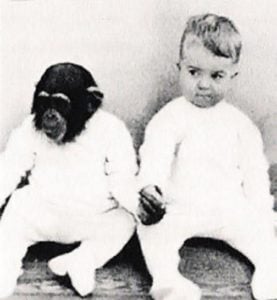
Winthrop Niles Kellogg (1898 – 1972) was a psychologist best known for his study The Ape and the Child, which involved his observations of raising a chimpanzee infant along with his son.
Gua and Donald raised together
Kellogg and his wife took into their Florida home a female chimpanzee, Gua, seven and a half months old when their son, Donald, was ten months old. Their purpose was to learn what similarities and differences would develop between Donald and Gua if treated alike in every detail.
The chimpanzee was dressed like an infant, in napkins and later in rompers. She was wheeled in a carriage, sat in a high chair, slept in a bed, and was kissed good night.
No special effort was made to teach Gua spectacular stunts but rather to teach her the same things a fond parent would do with a baby girl. The experiment was carried out with a careful day-by-day record of observations, films, and tests for a period of nine months.
Gua becomes like a human
Kellogg found that the chimpanzee was able to take on many human ways. Gua wore shoes and walked upright. She could eat with a spoon, drink from a glass, and open doors before the boy acquired those abilities. She imitated human gestures and ways of showing affection, like hugging and kissing Donald and the parents. Like most children, she made a fuss when the ‘parents’ went out and left them alone.
Gua’s rate of development was much faster than the boy’s, especially in the motor skills of climbing and jumping. She also learned to respond to ninety-five words and phrases such as ‘kiss Donald,’ ‘shake hands,’ and ‘show me your nose.’ However, she never learned to utter words or phrases other than to make known her wishes through grunts and squeals. Gua’s toilet training was appreciably slower than the control achieved by the boy.
“Definite limits “ to Gua’s humanization
Although the chimp progressed faster than the boy in the earliest stages, it became evident toward the end of the experiment that she was falling behind, especially in the matter of intellectual adaptation to human demands. The early superiority is attributed to the fact that anthropoids generally mature earlier than humans. A monkey reaches puberty at about four years, whereas humans reach puberty between twelve and fourteen on average, with girls usually reaching puberty before boys.
The report of this experiment by Dr. Kellogg and his wife indicated that an animal could achieve a good deal of human socializing through training and human association. But it also was noted that “there are definite limits to the degree of humanization that can be achieved by non-human species regardless of the amount of socializing and humanizing effects.”
.



